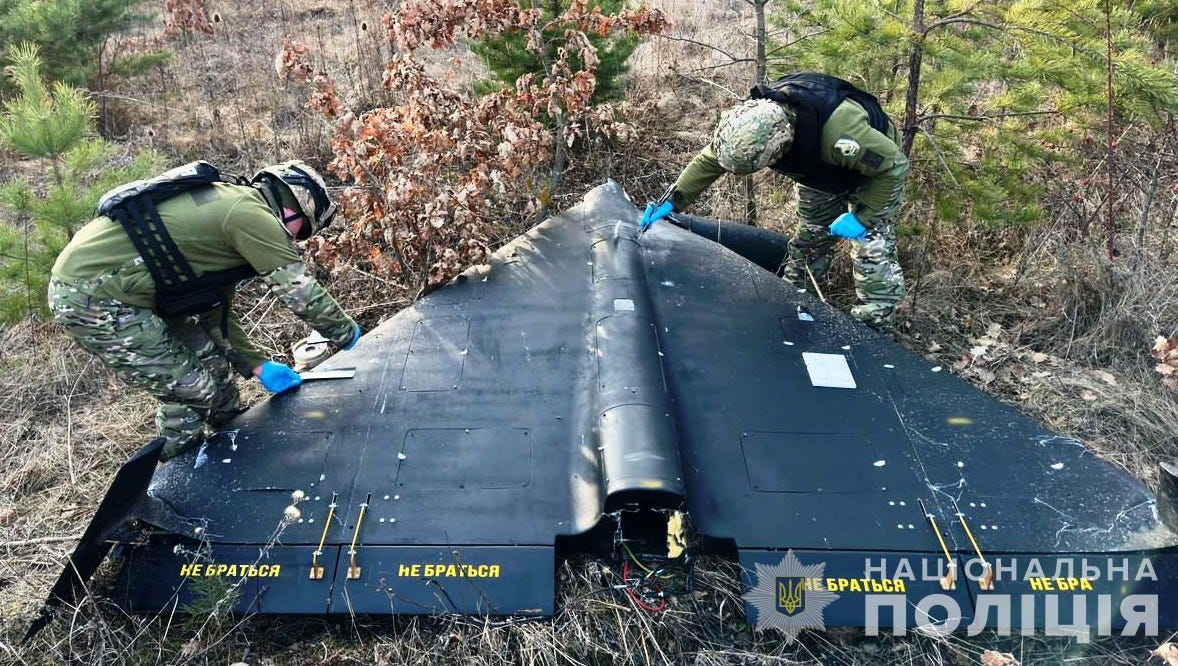Any Restraint on Europe’s Part in Responding to Russia’s War Would Encourage Aggression
For Our Own Security, It Is Time to Stop De-Escalating
Russian drone Geranium (Shahed), found in Vinnytsia region of Ukraine in March 18, 2024. By National Police of Ukraine (npu.gov.ua.) CC BY 4.0, https://commons.wikimedia.org/w/index.php?curid=151999564
An initial version of this article appeared online on September 28, 2025, under the title “Incursions de drones: ‘La Russie teste la résolution des sociétés démocratiques à répondre à ses menaces,’” in the leading French daily Le Monde, then in print on September 29, 2025 (Le Monde dated January 30, 2025). Le Monde also published an English version online on September 30. under the title: “Drone incursions: ‘Russia is testing the resolve of democratic societies to respond to its threats.”’
I would like to warmly thank the newspaper’s editorial staff for once again allowing me to publish a slightly updated and partially expanded and referenced English version here.
The coverage this piece got in France and a bit beyond prompted me to publish a longer version in English for my subscribers who might not have had access to it.
The overflight of drones, presumably Russian, over the airports of Copenhagen and Stockholm, the Norwegian fortress of Akershus, and Denmark’s largest military base are the latest in a long series of intimidation tactics by the Kremlin. They come after three Russian fighter jets entered Estonian airspace and drones of the same origin flew over Poland and Romania. At around the same time, four airports were the victims of cyberattacks, although it is not easy to attribute them. However, the intrusion, which is difficult to judge as accidental, targeted the American company Collins Aerospace, a provider of registration and boarding systems, which had just won a NATO contract for an electronic warfare command and control software system.
These events followed, among many others, numerous other cyberattacks, particularly against hospitals, acts of arson, notably in Poland, directly attributed to the Kremlin, and the jamming of the GPS signal of the planes carrying the President of the European Commission and, later on, the Spanish Minister of Defense. While it is not entirely certain that their planes were directly and explicitly targeted, these more frequent jamming incidents pose a major risk to civil aviation—the explosion of parcels in hangars that appeared to be intended for cargo planes in flight, targeted assassinations of Russian opponents, acts of sabotage, and a failed attack in July 2024 on the president of the German company Rheinmetall, a supplier of military equipment to Ukraine. Already in 2014, the attack on two ammunition depots in Vrbetice in the Czech Republic had claimed the lives of two citizens of that country. Add to this the cutting of several critical submarine cables and the increasing intrusion into the Baltic Sea of ships from the “Russian ghost fleet.”
Potentially lethal hybrid threats: why is our response insufficient?


